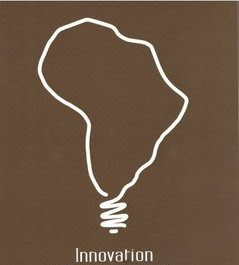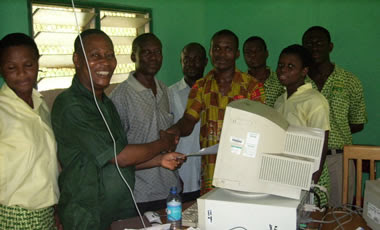As the semester draws to a close, I realize that creating and maintaining this blog has been a huge learning experience for me. It has taught me much more about myself and exposed me to so much information than I realized existed. When I chose my blog topic, it was my intention to shed light on where Ghana is in its technological adaptations and also to demonstrate how Africans in general always find unique ways of using technology to suit their unique needs. I gathered news information from different web sources such which are listed on the lower right of this blog page. I also got a lot of feed from twitter. The more African and international news sources I followed, the more headlines I was able to gather to report which helped me keep my blog content in high quality (in my opinion). I have gained a new appreciation for twitter because of this.
This class has been a very good learning experience. I am very glad that I took it. I have learned so much about trending technologies, how technology is changing the face of journalism and how the rate of adoption of new technology is reshaping everything from education to health to politics to fashion.
My favorite post would have to be the two posts regarding the use of Facebook by Africans and by Ghanaians. I think I loved this post the most because it was a compilation of research that I did myself. The statistics that I presented referring specifically to Ghana were gathered by my friend and me through a survey that I created. It confirmed one of the most important points presented throughout my blog. Mobile technology has penetrated Africa beyond grid electricity and land-line internet.
My least favorite post was that on the use of cell phones in the US which was a homework assignment for class. This is probably because the articles we had to read in order to respond to the topic involved a lot of data that was hard for me to synthesize.
I am ending with e-waste because I feel this is a topic that was not touched on in class. As an environmental science and technology major that grew up in Africa, this is a huge concern for me. A lot of emphasis in this class has been placed on what’s new and upcoming but no one has considered the effects of so much technology and hardware being produced. The only way to keep adopting new technology is to trash old ones, hence the big e-waste problem. Its killing the environment and causing poisoning to a lot of women and children in the developing world.
Overall, this has been an awesome experience. I do believe I will be blogging in the future.
Saturday, May 8, 2010
Recycling while bridging the global digital divide
In my previous post, I talked about electronic waste (e-waste) and how many developed countries are creating a new type of pollution in developing countries. This happens when old computers and other electronics are discarded or recycled but end up being shipped to landfills in developing countries instead of being handled in the regulated manner because it costs less to do so. Well, in this next story, we see how a company is making a difference in this trend.
Collecting and Recycling Ecologically (CARE): Computers for Developing Countries is a company based in the United Kingdom and operating in Ghana that takes redundant computers that British companies wish to discard and recycles them by donating them to schools and colleges in Ghana. This might sound like not such a big deal but here is where it makes a real difference. In the previous posting, the video showed how many of these discarded computers come as ‘donations’ and 50% of them don’t even work. This is what creates the waste because no one is going to repair these outdated computers so they get thrown away. And then the pollution gets out of hand when there is such an abundance of these that they are burned for their copper wire by scavengers and children releasing toxic fumes.
CARE removes this danger by assessing every computer that goes through their system. Computers and computer equipment is collected from businesses, schools and individuals for a small fee. All data on the equipment is then wiped clean to Ministry of Defense standards. It is after this that the computers are shipped to Ghana for distribution. They are taken to service centers that are responsible to installing new programs as well as training IT specialists to maintain the PC systems once installation is complete at the schools. After the donations, the students and teachers are also trained to use and maintain computers. Their program enables schools in Ghana and the UK learn from each other as they collaborate through the internet. They are working towards projects that will forge international projects and relationships.
But there is yet another component of this company that does even more to combat pollution in Ghana. There is an increasing plastic waste problem that exists in the country. Almost everything that is sold in Ghana is vended in plastic bags, including water. Water is sold on city streets in plastic packets instead of bottles. These plastic packets and black plastic bags used to hold everything have been accumulating on trash dumps and on the streets since they aren’t biodegradable. Currently, there is no national waste management system in the country. The bags also clog the drainage systems causing floods during the heavy rain season. For this reason, an ‘Eco-Code’ has been drafted by CARE to be signed by all students of schools that receive computers donations. This code requires them to put measures in place to curb this pollution.
I look forward to seeing how CARE will change the face of pollution and recycling in Africa and the e-waste menace.
Labels:
E-waste,
Ghana,
recycling,
technology gap
Subscribe to:
Posts (Atom)



